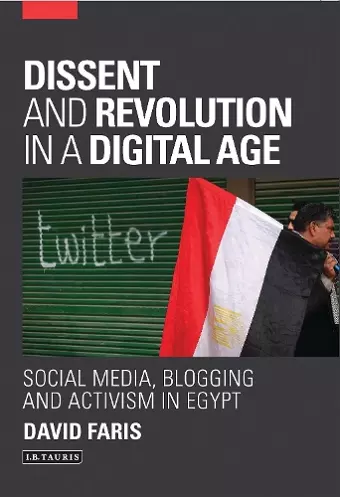Dissent and Revolution in a Digital Age
Social Media, Blogging and Activism in Egypt
Format:Hardback
Publisher:Bloomsbury Publishing PLC
Published:30th Mar '13
Currently unavailable, and unfortunately no date known when it will be back

During the Arab uprisings of early 2011, which saw the overthrow of Zine el-Abadine Ben Ali and Hosni Mubarak,the role of digital media and social networking was widely reported. This was also recognized by the authorities fighting against popular pressure for change, and the Egyptian government's attempt to block internet access demonstrated this.
During the Arab uprisings of early 2011, which saw the overthrow of Zine el-Abadine Ben Ali in Tunisia and Hosni Mubarak in Egypt, the role of digital media and social networking tools was widely reported. With tens of thousands publicly committed to public protest through their online social networks, and with calls to protest circulating through email networks, Facebook groups, and street organizing, the activists had set in motion a staged confrontation with the Egyptian regime, of the sort that had previously been unthinkable. The potentially subversive nature of social networks was also recognized by the very authorities fighting against popular pressure for change, and the Egyptian government's attempt to block internet and mobile phone access in January 2011 demonstrated this. What is yet to be examined is the local context that allowed digital media to play this role: in Egypt, for example, a history of online activism has laid important ground work.
Here, David Faris argues that it was circumstances particular to Egypt, more than the 'spark' from Tunisia, that allowed the revolution to take off: namely blogging and digital activism stretching back into the 1990s, combined with sustained and numerous protest movements and an independent press. During the Mubarak era, where voicing a political opinion was - to say the least - risky, and registering as a political party was onerous and precarious undertaking, it was online avenues of discussion and debate that flourished. Over the course of those years, digital activists - bloggers and later, users of other forms of social media like Twitter, Facebook and Youtube - scored a number of important victories over the regime, over issues largely revolving around human rights. Faris analyses these activists and their online activities and campaigns, examining how the internet was used as a space in which to create identities and spur action.
Dissent and Revolution in a Digital Age tracks the rocky path taken by Egyptian bloggers operating in Mubarak's authoritarian regime to illustrate how the state monopoly on information was eroded, making space for dissent and for those previously without a voice.
Understanding the role of digital media in the evolution of the Arab Spring is a monumental task, and talking about 'Twitter Revolutions' or 'Facebook Uprisings' is a nonstarter. David Faris makes compelling arguments precisely because his analysis is not tied to a particular tool or application. With a focused study of Egypt, he is able to demonstrate the strong connection between social media diffusion and civic mobilisation. Yet through his comparative study of other recent digital uprisings, he is able to demonstrate a weak connection to the success of those revolutionaries who get inspired by digital cascades of information'. Philip N. Howard, Fellow of Princeton University and the author of The Digital Origins of Dictatorship and Democracy: Information Technology and Political Islam. (2010) 'David Faris has written a thoughtful, broadly comparative and theoretically informed analysis of social media in Egyptian politics over the last decade. With a wide range of rich examples, he shows how and where the new media environment mattered as well as where its impact has been exaggerated. A welcome contribution to the growing comparative literature on the political effects of the internet in the Arab world and beyond.' Marc Lynch, Associate Professor of Political Science at George Washington University and author of The Arab Uprisings: The Unfinished Revolutions of the New Middle East (2012). 'A powerful new contribution to the growing body of knowledge on social networks and political change, Dissent and Revolution in a Digital Age is an important resource for scholars, policymakers and activists seeking to understand the circumstances under which digital tools aid mobilisation and collective action in authoritarian contexts.' Shanthi Kalathil, co-author of Open Networks, Closed Regimes: The Impact of the Internet on Authoritarian Rule (2003).
ISBN: 9781780761503
Dimensions: unknown
Weight: 493g
288 pages